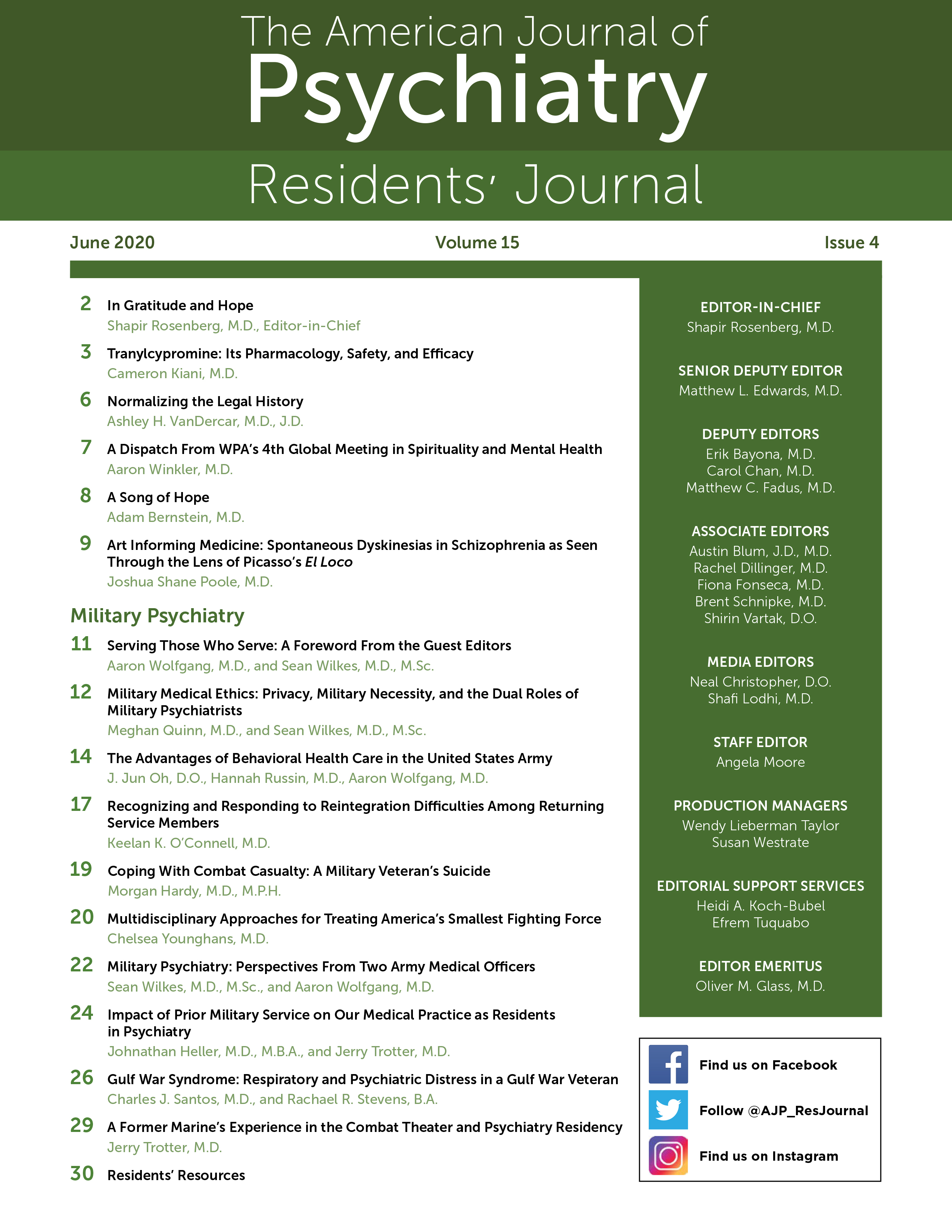During a typical morning of combat-trauma therapy group, one patient described unrelenting nightmares after years of direct combat operations, legs bouncing vigorously enough to vibrate a water bottle at the other end of the conference table. A civilian social worker asked, "So, you've been boots on ground?" The next patient recounted how well-intentioned providers "will never understand." Another member of the combat posttraumatic stress disorder (PTSD) group added, "My doc was in the Army in Vietnam before he became a psychiatrist. You can see in his eyes that he understands. Sometimes, he doesn't have to say anything. We just sit together in that knowing." Pausing, they shared the veteran-physician's contact information. When the group members learned of our combat experience, the tenor shifted from cynical vetting to knowledge seeking.
Medical practice reflects the spirit of the clinician, influenced by mentors, institutional pressures, and academic zeitgeist. Psychiatry carries unique responsibility to cognize how patients merge their sense of self in values, struggles, and goals. Comprehensively grasping the interplay between person and impairment requires more than openhearted patience. Subcultures of psychiatry might be particularly influenced by life experience. Specifically, nonmedical experience, such as combat service prior to entering the medical profession, inherently shapes patient care. Exceptional heroism aside, the common experiences of ground troops are exquisitely dissimilar from those of psychiatric residents and clinicians.
Military culture is defined by subcultures—tribes of those who have "been there" or not. Combat is a distinguishing rite of passage, often shared hesitantly with the out-group. A Special Forces patient said, "When I hear someone speaking, I first look at their ribbons, and if they have a Combat Action Ribbon, I'll listen, because they understand." Although combat experience is not a prerequisite to providing quality care to veterans, for many veterans, combat-experienced healers may help them unburden their trauma and identity isolation. Our hope is that by bringing light to this important group of patients and some of their values, we may empower other providers in strengthening their capacity to build a therapeutic alliance with their patients.
Meet patients where they are. Military physicians, especially trainees, often report apprehension providing care for individuals with military service different from their own. Concurrently, military patients report expecting neither to be understood nor recognized for their service (
1). Initially accessing mental health care requires challenging entrenched career and social stigma. Indeed, patients returning from deployment who have higher risks of PTSD and traumatic brain injury and who require treatment with psychotropic medications are unlikely to complete mandatory universal screening assessments, such as the Post-Deployment Health Reassessment, which are critical to identifying needs and accessing resources (
2). At this nexus of barriers, building therapeutic alliance may prove difficult, and despite evidence-based recommendations, follow-up may be challenging.
We have been involved in hundreds of patient encounters in Department of Defense and Veterans Affairs clinic settings, and we have repeatedly seen how combat-experienced physicians are highly regarded by service members seeking care related to deployment (
3). The assumption that combat experience informs treatment of combatants is frankly not informative. Here, we have attempted to highlight the perceived influences of combat exposure on subsequent medical practice that are broadly applicable to all active duty and former servicemembers, regardless of military affiliation or experience.
Because combat exposure changes the individual, many patients defy completing surveys and objective checklists, whether they directly state their opposition or not. Studies have shown that strong bonds are often formed between patients and physicians of similar ethnic, racial, and cultural backgrounds. Here, we have described some values of the warrior in-group to explore the practical impact of military service history. In all settings, we suggest that clinicians enrich care through the compassion of exploring shared understanding.
Acknowledgments
The authors thank Dr. Hamid Tavakoli, a required institutional sponsor for this commentary.
